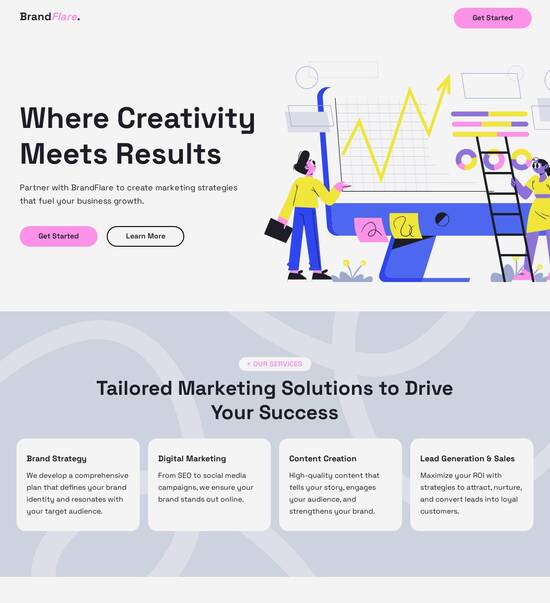
HTML page template for Crop Production
Use TemplateAbout template
Conquer your niche with our high-converting landing page templates for your Crop Production business. Let's boost conversion rates together!
Recommended templates

Easy to build without coding
With the intuitive drag-and-drop builder, anyone on your team can create high-converting pages without any knowledge of code or design. Make enhancements to your landing page with custom widgets using Javascript, HTML/CSS, or third-party scripts.

Multiple layouts for any industry and goal
Select from 500+ landing page layouts built to boost conversions across industry-specific scenarios. Customize them by adjusting fonts, adding images, and generating on-brand content with the AI assistant. Quickly scale with Instablocks® and Global Blocks that you can save, reuse, and update globally.

Loads fast and looks polished on any device
Every template is responsive, which means they present professionally on any device and load blazingly fast with our Thor Render Engine. You can also power them up with Google AMP technology to deliver an unparalleled mobile experience and drive higher conversions.

Robust analytics & experimentation
Get real-time updates and reporting across all your devices, showing the number of visitors, conversions, cost-per-visitor, and cost-per-lead. Launch AI-powered experiments, run A/B tests, and use heatmaps to analyze user behavior, then optimize your landing page to maximize conversions.







Easy to build without coding
With the intuitive drag-and-drop builder, anyone on your team can create high-converting pages without any knowledge of code or design. Make enhancements to your landing page with custom widgets using Javascript, HTML/CSS, or third-party scripts.
Multiple layouts for any industry and goal
Select from 500+ landing page layouts built to boost conversions across industry-specific scenarios. Customize them by adjusting fonts, adding images, and generating on-brand content with the AI assistant. Quickly scale with Instablocks® and Global Blocks that you can save, reuse, and update globally.
Loads fast and looks polished on any device
Every template is responsive, which means they present professionally on any device and load blazingly fast with our Thor Render Engine.
Robust analytics & experimentation
Get real-time updates and reporting across all your devices, showing the number of visitors, conversions, cost-per-visitor, and cost-per-lead. Launch AI-powered experiments, run A/B tests, and use heatmaps to analyze user behavior, then optimize your landing page to maximize conversions.
All the features you need to build lead-generating landing pages
Explore more featuresLearn how to build top-performing landing pages for any goal
FAQs
Leading the way in building high-performing landing pages





A comprehensive guide to mastering landing pages on Instapage
Creating effective landing pages is essential for maximizing your digital marketing campaigns, and Instapage offers the most powerful tools to help you do that. This guide outlines step-by-step instructions for leveraging Instapage to streamline your landing page creation process, optimize for conversions, and improve your overall ROI. Whether you're in business services, tech, or education, understanding how to utilize Instapage can transform your marketing efforts.
Understanding the power of Instapage
Instapage is designed for marketers who need a flexible and efficient way to create landing pages without involving a developer. With over 100 conversion-focused templates and drag-and-drop elements, you can quickly tailor your pages to your audience's needs. This platform eliminates the hassle of coding and lets you focus on strategic marketing efforts.
- Speed: Quickly create high-converting landing pages that capture leads with minimal effort.
- Flexibility: Access a library of templates suited for various campaigns and sectors.
- No coding required: Use easy-to-navigate builders to customize your pages effortlessly.
Step 1: Choose the right template
Begin your journey by selecting a template that matches your campaign goals. Instapage offers a plethora of options tailored for different industries, including education and financial services, ensuring your landing page resonates with your target audience.
- Select a template that aligns with your campaign objectives.
- Make use of pre-built lead generation elements to streamline the process.
- Customize key sections to reflect your unique brand identity.
Step 2: Optimize with built-in features
Once your landing page is designed, it's time to optimize it for conversions. Instapage provides several built-in features that allow you to experiment and refine your approach. Use A/B testing and heatmaps to gather insights and make data-driven decisions.
- Conduct A/B tests to evaluate the effectiveness of different page elements.
- Utilize heatmaps to visualize visitor behavior and make necessary adjustments.
- Monitor your analytics dashboard to track overall performance.
Step 3: Personalization for higher engagement
Personalize your landing pages to enhance user experiences. Instapage’s dynamic text replacement and AdMaps feature allow you to display tailored content that engages visitors based on their specific interests. This targeted approach can significantly boost conversion rates across different marketing segments.
- Use dynamic text replacement to match ad copy with landing page content.
- Implement AdMaps to guide visitors from specific ads to tailored landing pages.
- Use audience-level metrics to refine your messaging strategy.
In summary, leveraging the power of Instapage allows marketers to create optimized and engaging landing pages that drive results. By following this guide, you can maximize your campaign's effectiveness and increase your ROI.
Ready to transform your digital campaigns? Start with Instapage today and experience firsthand how its powerful features can take your marketing strategy to new heights.
HTML page template for crop production: A comprehensive guide
Understanding the importance of crop production
Crop production has evolved significantly over the years, particularly from 2007 to 2025, when agricultural practices began incorporating technological advancements. Early in this period, farmers relied heavily on traditional methods. However, by 2025, the use of precision agriculture, drone technology, and data analytics became commonplace, revolutionizing the way crops are cultivated and managed.
Current statistics showcase the profound impact technology has had on global crop production rates. By 2025, data suggests a substantial increase in production efficiency, with crops like maize, wheat, and rice dominating the markets. The shift towards integrating technology into farming not only optimizes production but also enhances sustainability.
Defining an HTML page template for crop production
An HTML page template serves as a foundational structure for web development, particularly suited for various industries, including agriculture. These templates are designed to streamline the process of creating user-friendly web pages, enabling farmers and businesses in crop production to communicate effectively with stakeholders. In the agriculture sector, these templates can be tailored to meet the unique needs of farming communities.
Key features specific to crop production templates include user-friendly designs that prioritize accessibility for all users, regardless of their technical proficiency. Additionally, responsive design ensures that the content is viewable across multiple devices, such as smartphones and tablets, which is critical as more users access information on the go.
User-friendly design for all skill levels
Responsive layout for different devices
Visual tools for easy data interpretation
Unique components of an HTML template for crop production
CSS styling plays a critical role in enhancing the user experience on agricultural websites. Custom styles can reflect agricultural branding, establishing a visual connection with the target audience. The careful selection of color schemes and imagery not only beautifies the web page but also conveys a sense of trust and relevance to potential clients.
Moreover, a well-structured navigational sitemap can improve a website's visibility on search engines. Conforming to Google's XML sitemap recommendations allows search engines to index the page more effectively, driving organic traffic. Attention to privacy and rights considerations is also paramount, as the agricultural sector must navigate compliance with local regulations concerning data protection and rights management.
Reflect agricultural branding through CSS styles
Incorporate well-structured navigational sitemaps
Align privacy policies with farming regulations
Crafting effective content for crop production pages
To engage visitors effectively, crop production pages should include essential elements that detail crop varieties, specifications, and pertinent farming techniques. Providing insights into local and global market trends can also empower farmers by equipping them with knowledge to make informed decisions. Furthermore, showcasing local farmers fosters a sense of community and encourages collaboration.
Utilizing interactive features can enhance user experience as well. Tools for real-time data sharing keep users informed about market fluctuations. A community forum encourages knowledge exchange among farmers, creating a valuable network that can lead to improved practices and productivity.
Include details on crop varieties and specifications
Showcase local farmers to build community
Incorporate tools for real-time data sharing
The technological edge in crop production templates
Integration with agricultural software can significantly enhance the functionality of crop production HTML pages. By connecting these pages to crop management systems, stakeholders can streamline their processes, track data accurately, and make informed decisions. The importance of APIs cannot be overstated, as they synchronize data across platforms, creating a seamless user experience.
Looking towards the future, template design will evolve significantly. AI-driven templates customized to specific agricultural needs will emerge, allowing farmers to engage with technology more intuitively. Additionally, the potential for virtual and augmented reality in web pages will provide immersive experiences that can further educate users and improve engagement.
Connect HTML pages with crop management systems for efficiency
Utilize APIs for data synchronization
Explore AI-driven template designs for personalization
Dos and don'ts in creating crop production HTML pages
Creating effective crop production pages involves adhering to best practices for design and content management. Keeping content concise and focused on the core subject is essential; emphasis should remain on twelve key elements that provide value to the reader. Regular updates and maintenance of the website's content ensure that it remains relevant and valuable to users.
Avoiding common pitfalls is equally important. Overloading pages with excessive information can overwhelm users, detracting from the primary message. Ignoring user feedback and analytical data can lead to missed opportunities for improvement and enhancement of the user experience.
Maintain concise and focused content
Regularly update for relevance
Avoid information overload
Case studies of successful crop production HTML pages
Analyzing successful agricultural websites reveals insightful strategies that can inspire new designs. For instance, profiles of innovative companies highlight twelve key successes in effectively utilizing HTML templates tailored for crop production. Lessons learned from their design strategies illuminate ways to engage an audience while portraying an authentic representation of the farming community.
Additionally, community impact stories demonstrate how effective templates foster the growth of local farming communities. Quantifiable benefits include a notable 43% increase in engagement, evidencing that well-structured pages contribute to community development and knowledge dissemination among farmers.
Profile successful agriculture companies using strategic templates
Analyze community impact through enhanced engagement
Learn from innovative design strategies
The road ahead: evolving needs of crop production
As we look ahead to 2025, it's crucial to anticipate the changes that will impact crop production. Emerging challenges, such as climate change and resource scarcity, will require adaptive strategies. Technology's role in promoting sustainable practices cannot be understated, as it offers solutions that can redefine agricultural approaches.
Future innovations in web templates for agriculture will be shaped by these evolving needs. Predictions suggest advances in CSS and user experience design that will align better with agricultural workflows. Furthermore, ongoing trends in data privacy will influence how templates are built, ensuring they comply with social and governmental standards.
Anticipate emerging challenges in crop production
Embrace technology for sustainable practices
Monitor data privacy trends in template design
Ready to skyrocket conversions?
Supercharge your ad campaigns with high-performing landing pages
Get started














